Big Cartel vs Shopify: Which Platform Is Best For Dropshipping?
I'm looking for...
Are you ready to turn your entrepreneurial dreams into reality but feeling stuck between Big Cartel vs Shopify for your online store?
Choosing the right e-commerce platform can be as crucial as the products you sell. In this bustling digital age, where your online presence can make or break your business, Big Cartel and Shopify emerge as the frontrunners.
But which one is the right fit for you? Whether you’re a budding artist hoping to showcase your creativity or a seasoned entrepreneur planning to scale your operations, understanding each platform is key.
Dive into my comprehensive analysis of Big Cartel vs Shopify, where I explore which platform caters best to your unique business needs and why this choice might be the most significant one you make this year.
Create Your Online Store in just 5 Minutes – For Free
Pick your niche, our AI builds your store, add 10 winning products and we teach you how start selling today. Start picking your niche
What Is Big Cartel?

Big Cartel is like your very own boutique in the digital world. It’s a user-friendly platform designed for creators and small business owners to sell their unique products online.
Whether you’re an artist, a crafter, or a small-scale producer, Big Cartel makes it straightforward to set up a shop that reflects your style.
You don’t need to be tech-savvy to get started. It provides all the essentials, such as inventory tracking, order management, and basic analytics, to help you keep your business running smoothly online.
What Is Shopify?
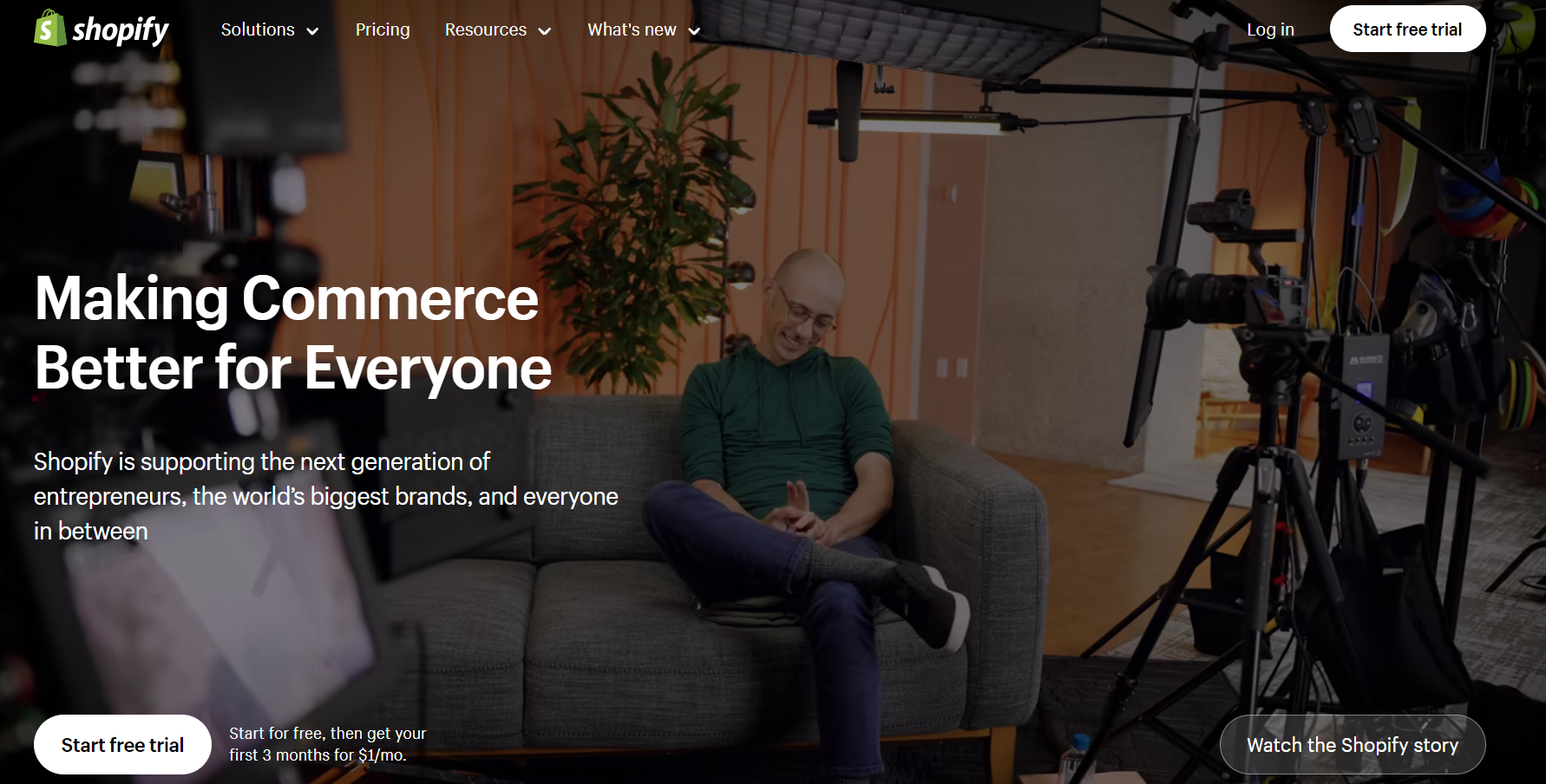
Shopify is like a powerhouse tool for setting up your own dropshipping store. It’s a comprehensive platform that supports entrepreneurs and businesses of all sizes in creating and managing their e-commerce presence.
With Shopify, you can customize your store’s design, manage inventory, accept payments, and ship your goods all from one place.
It’s packed with features that help you sell both online and in-person, making it a great choice for anyone looking to expand their business across multiple sales channels.
Whether you’re just starting out or looking to grow, Shopify offers tools that can scale with your needs.
Big Cartel vs Shopify Quick Comparison
| Criteria | Big Cartel | Shopify | Winner |
|---|---|---|---|
| Ease of Use | User-friendly with a simple setup. | Intuitive with more advanced features and easier scaling. | Big Cartel |
| Customization | Limited customization options. | Extensive customization with a wide range of themes and tools. | Shopify |
| Pricing | More affordable with a free plan. Pricing plans start at $15/month, and there are no additional fees. | A vast ecosystem of apps and integrations. | Big Cartel for affordability, Shopify for features |
| Integrations and Apps | Fewer integrations. | Vast ecosystem of apps and integrations. | Shopify |
| SEO Tools | Basic SEO tools. | Comprehensive SEO tools and capabilities. | Shopify |
| Product Limits | Limits on product listings. | Unlimited product listings. | Shopify |
| Sales Channels | Primarily online stores. | Supports both online and offline sales channels. | Shopify |
| Customer Support | Limited support options. | 24/7 support with multiple channels. | Shopify |
| Dropshipping Capabilities | Suitable for small scale and unique products. | Extensive support for dropshipping with numerous automation tools. | Shopify |
| Payment Options | Basic options with no transaction fees. | More payment options and integrated solutions. | Shopify |
Big Cartel vs Shopify: Which Platform is Better For Dropshipping?
When picking a platform for your dropshipping business, think about what you need, how much you can spend, and your future goals.
Big Cartel and Shopify are both great choices, but they serve different purposes. However, what I tend to say about these two is that, if Big Cartel is a rowboat, Shopify is a cruise ship.
Big Cartel is best for individuals or small businesses that have a limited number of unique products to sell. It’s simple to use and doesn’t cost much.
So, it is a good choice if you’re just starting out or if you prefer a no-fuss approach to selling online.
Shopify, on the other hand, is more powerful and packed with features that can help a business grow.
It’s perfect if you plan to expand your business and need a platform that can handle more products, customers, and sales as you grow. Shopify is great for handling everything from inventory management to marketing and sales analysis.
In short, go for Big Cartel if you want something easy and affordable. Choose Shopify if you’re looking to build a larger business and need a platform that can grow with you.
Also, I personally think that, yes, Big Cartel is way more affordable at first sight. However, the functionalities and support that Shopify gives for building a dropshipping business are way superior.
Your choice should match the size and scope of your business dreams and how much you’re ready to invest in building your online store.
Now, let me explain in-depth my opinion about Big Cartel vs Shopify for dropshipping.
Who Should Use Big Cartel?
Big Cartel truly stands out as a platform for creative minds and hands-on creators. If you’re an artist, an independent creator, or a small business owner with a unique line of products, this platform is specifically designed for you.
The platform partners with famous print on demand companies, where you can design your own products with ease.
It’s particularly ideal if you’re just starting out in the world of e-commerce.
Big Cartel offers an easy-to-use interface and affordability—beginning with a free plan, importantly, there are no hidden fees, making it a preferred choice for beginners.
Who Should Use Shopify?
If you’re considering selling products online, Shopify could be a great choice for you. It’s designed to support various types of businesses:
- Small to medium-sized businesses looking to start or expand their online presence will find Shopify’s tools quite useful.
- Large enterprises can benefit from Shopify’s capacity to handle high sales volumes and complex e-commerce activities.
- Individual entrepreneurs and those interested in starting a dropshipping business can easily get off the ground with minimal upfront investment.
- Brick-and-mortar stores that want to move into the online world will appreciate Shopify’s ability to integrate in-store sales with online operations.
No matter your business size or type, Shopify provides a flexible and powerful platform to build and manage your online store.
Big Cartel vs Shopify: Ease Of Use
Big Cartel Ease of Use
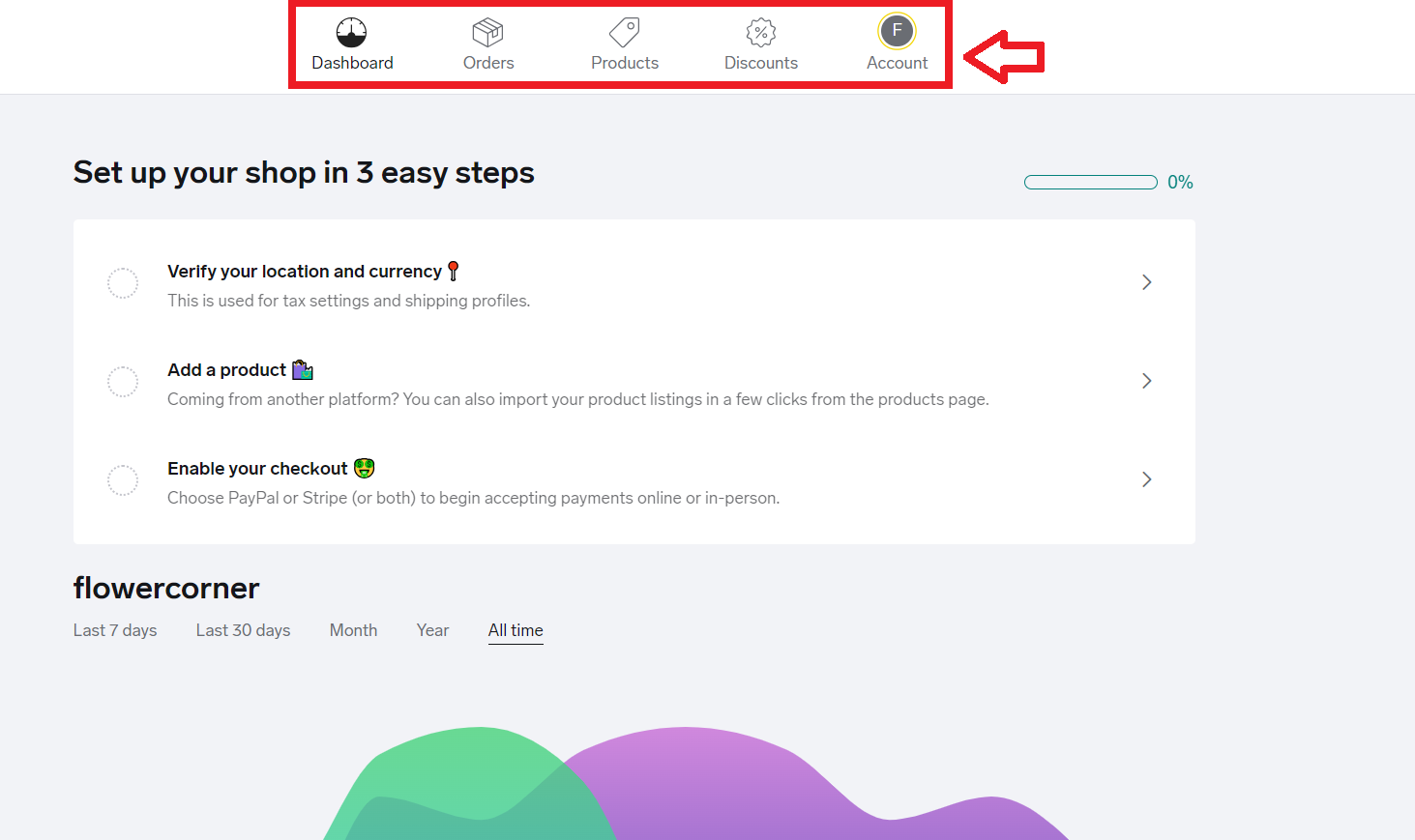
Setting up a dropshipping store with Big Cartel is straightforward.
The platform’s dashboard is user-friendly, with intuitive controls and features that are easy to navigate.
As you work through setting up your online store, Big Cartel offers handy prompts and guidance, making it an ideal choice for creating a simple and sleek website.
The onboarding process is designed to be smooth. Unlike other platforms that might leave you to fend for yourself, Big Cartel helps you every step of the way with reminders and tips to ensure your shop is ready and optimized before you start selling.
However, keep in mind that if you want to dive into deeper customization of themes, you’ll need some HTML coding skills.

When I was testing out the platform, I managed to add six products and put together a basic online store in just a few hours. What really stands out about Big Cartel is how it prevents you from feeling overwhelmed.
Even under the free plan, which offers basic features, there are useful help bubbles strategically placed to explain new fields and options, ensuring a smooth experience for new users.
Shopify Ease of Use
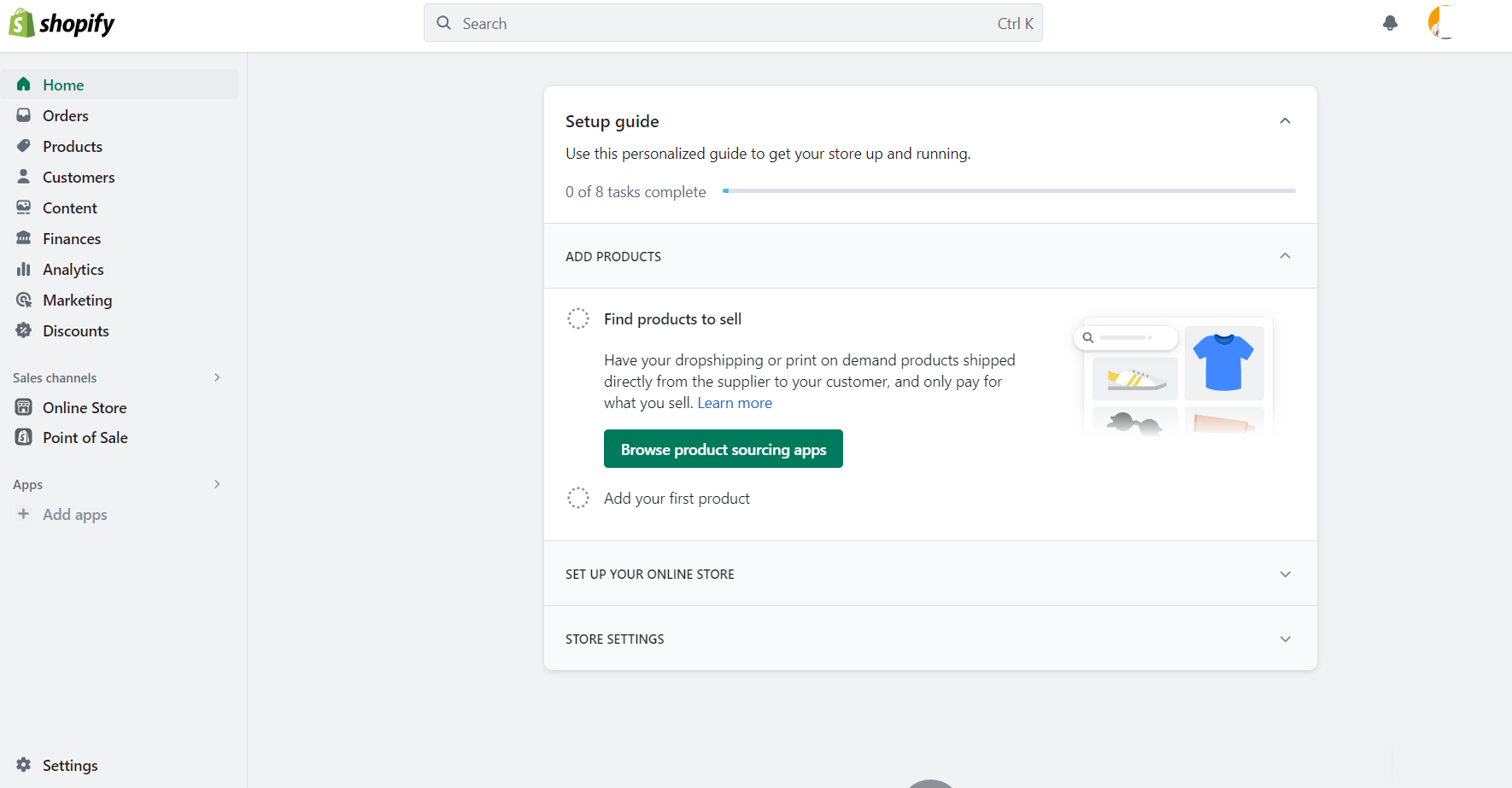
Shopify is celebrated for its user-friendliness, which makes it a top pick for both newcomers and seasoned e-commerce professionals.
It features a clear and intuitive interface, making it straightforward to navigate and manage your online store. The dashboard is well-organized, allowing you to effortlessly find various features and settings.
Additionally, getting your store up and running on Shopify is quick and easy. The platform includes a step-by-step guide that helps you through the setup process—from creating your store and adding products to customizing the design.
Moreover, Shopify offers a wide selection of pre-designed themes. Thanks to its drag-and-drop editor, customizing these themes to fit your brand’s unique style is a breeze.
This combination of simplicity and flexibility ensures that you can start selling in no time and have your store look exactly how you want it.
Big Cartel vs Shopify: Key Features
Store Builder & Customization
BigCartel Store Builder & Customization
Big Cartel provides a straightforward website builder with each of its plans, featuring a modest collection of 18 themes.
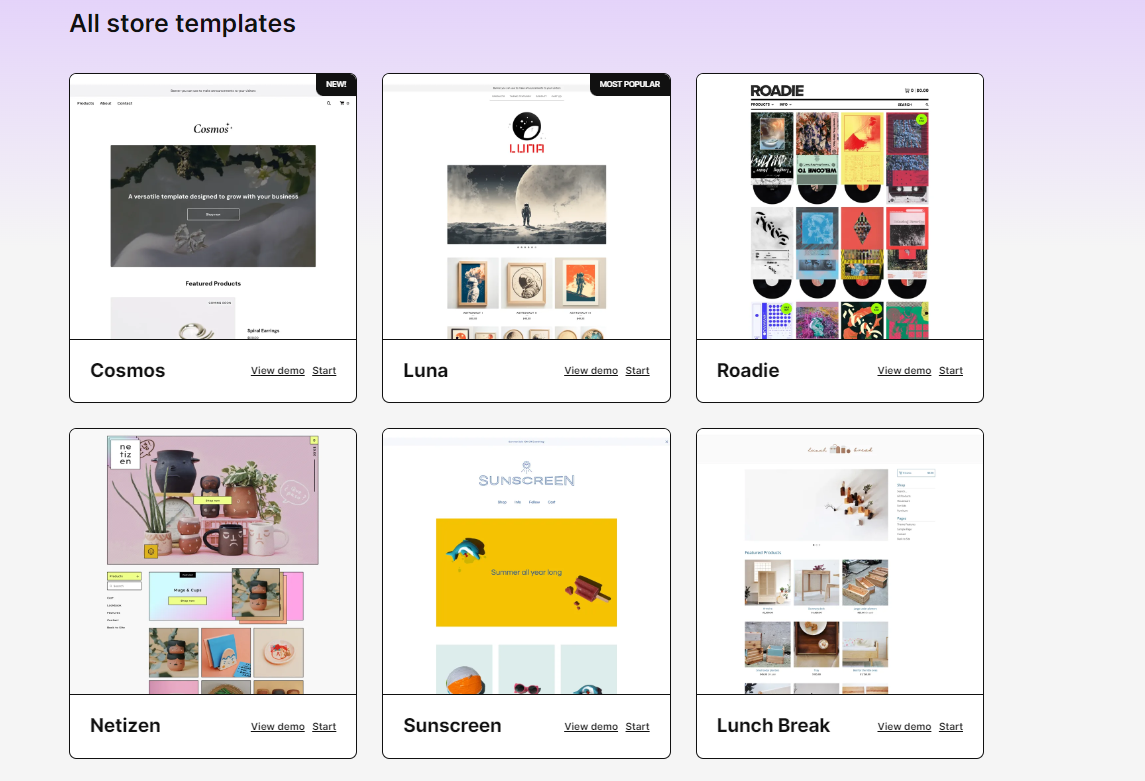
Despite the limited number, the themes are quite diverse in design, giving you a decent chance of finding one that suits your business style.
However, theme customization options in Big Cartel are fairly basic, mainly focusing on color choices and text alignment.
You won’t be able to add or remove sections from your homepage. Also, while adding custom pages is possible, they are confined to a basic text editor, limiting your design capabilities.
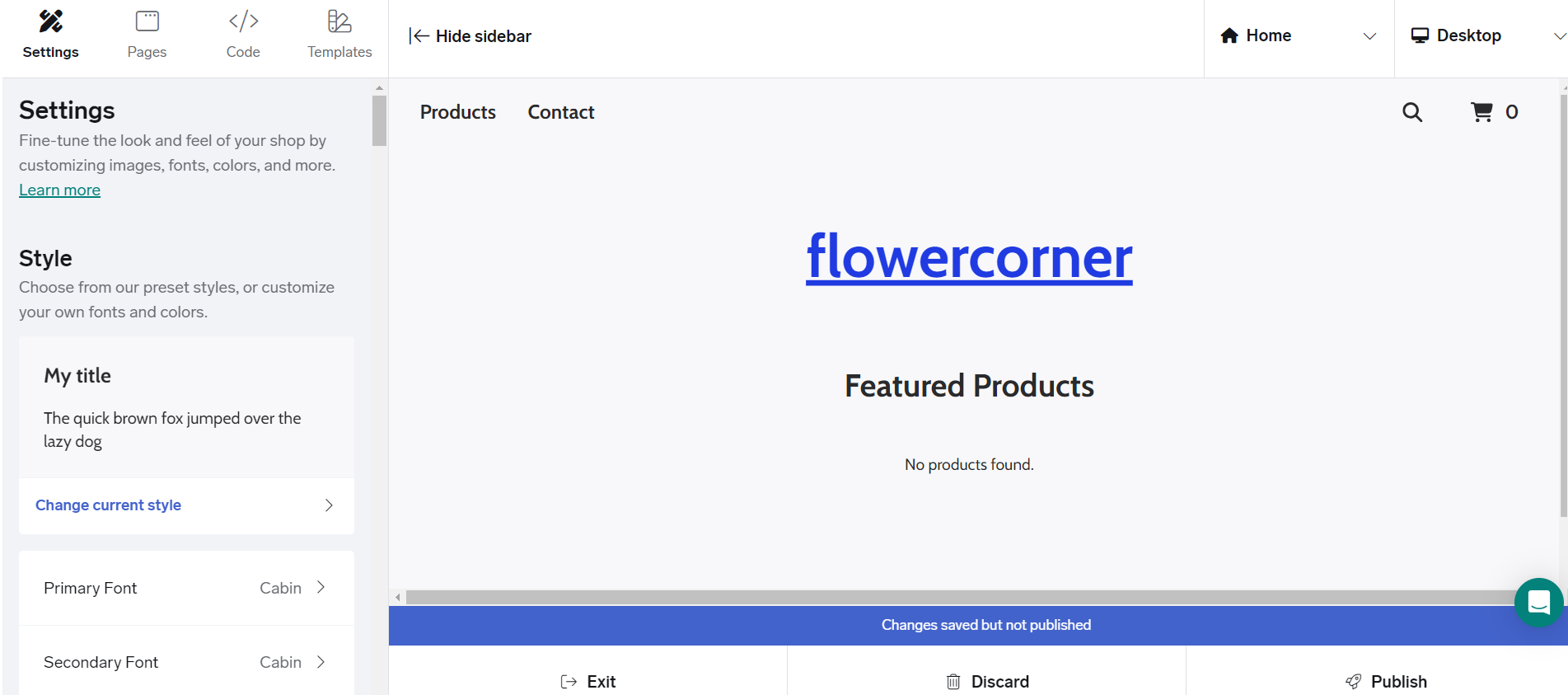
Because of these limitations, choosing the right theme from the start is crucial, as there’s little room for further customization to make your store unique among other Big Cartel sites.
Additionally, there are no options for adding a blog or implementing comprehensive SEO tactics for pages or products. This can be a setback if you rely on organic traffic for marketing.
Overall, flexibility with Big Cartel’s themes is limited. Hence, you can’t customize fonts, place banners freely, or add videos to your product listings.
This means you’ll need to work within the constraints of the platform while trying to craft your online presence.
Shopify Store Builder & Customization
I absolutely love Shopify! It’s my top choice for setting up a dropshipping store. Since I use it personally, I’m excited to share some insights about its customization and design features.
First off, you’ll want to pick a theme from Shopify’s theme section. I have to say, their selection is impressive. Thus, they offer over 194 free and paid templates, including 11 free themes, which is quite generous.
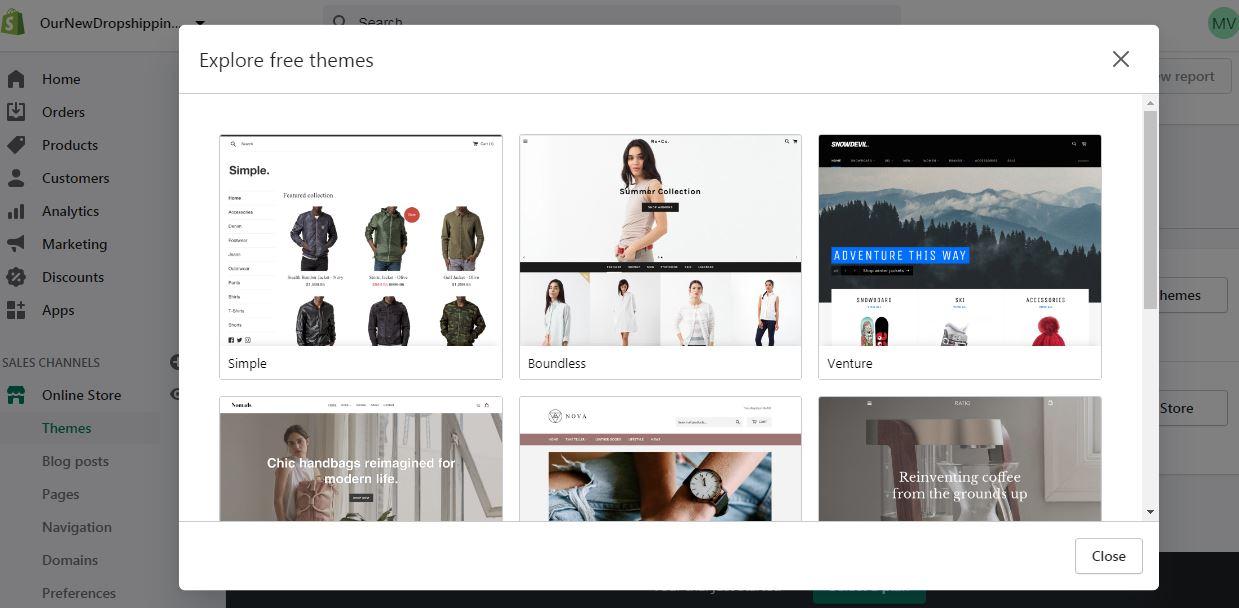
Once you’ve chosen your theme, you’ll appreciate the flexibility it offers. You can modify, add, rearrange, or even temporarily hide sections and blocks on your pages. This gives you total control over how your dropshipping store looks and functions.
Plus, the Shopify drag-and-drop editor makes these adjustments super easy.
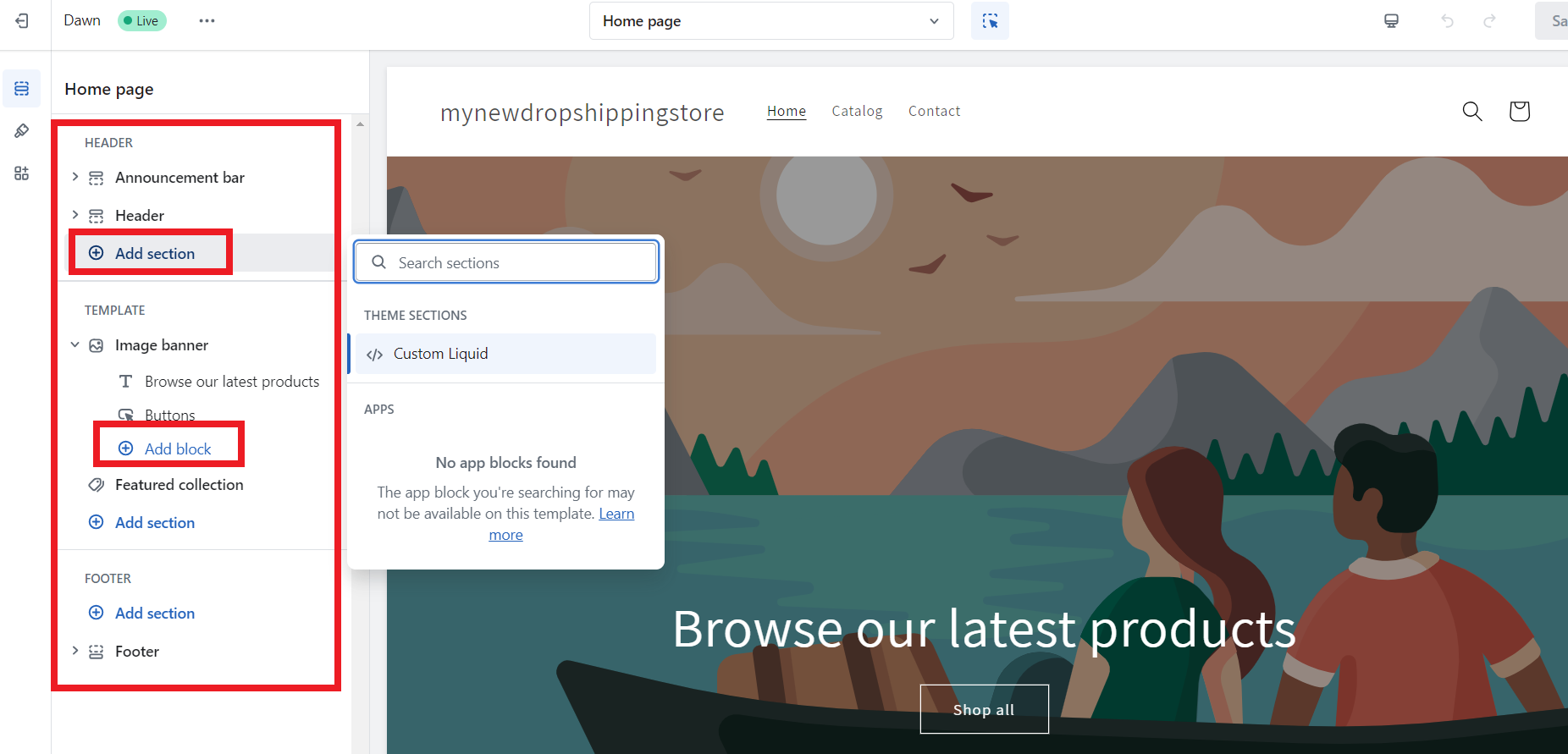
To further personalize your store’s look and feel, you can tweak the typography and colors. Just head over to the “Theme Settings” section, which you’ll find on the left sidebar, symbolized by a brush icon.
Additionally, Shopify allows you to add as many landing pages as you need, create image sliders, feature specific images, customize your footer, and more.
These tools are all about giving you the creativity to make your store unique.
Integrations & Apps
Big Cartel Integrations & Apps
Big Cartel might seem limited with fewer than 30 direct integrations, but it still covers essential services that can enhance your online store.
For marketing and promotion, you can link your store with tools like Mailchimp for email marketing, LiveChat for direct customer engagement, Instagram for social media presence, and Poptin for custom pop-ups and forms.
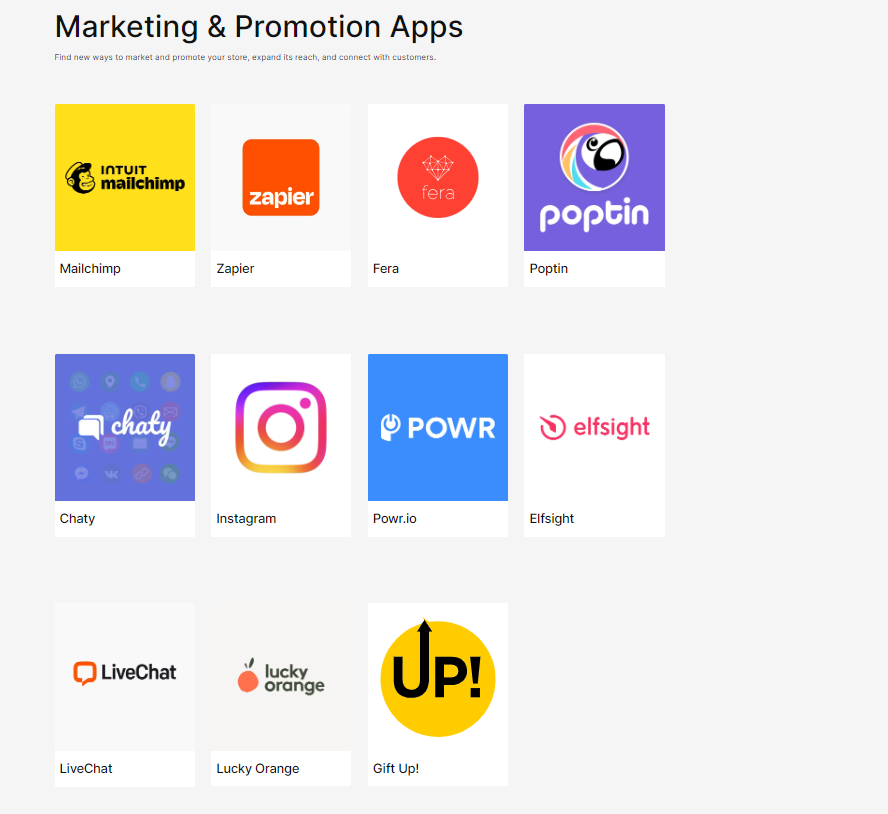
When it comes to shipping, Big Cartel allows you to connect with well-known shipping apps such as ShipStation, ShipRush, ShippyPro, ShipRobot, and Pirate Ship to streamline your shipping processes.
For those involved in manufacturing and fulfillment, especially if you handle on-demand products, integrating with services like Printful and Art of Where is possible.
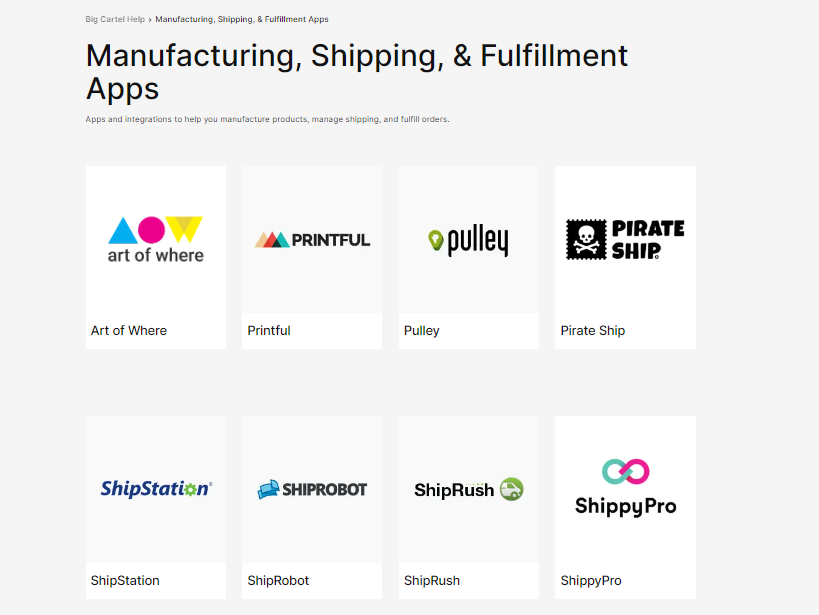
Plus, you can manage digital products through a connection with Pulley.
Moreover, Big Cartel’s integration with Zapier opens up the possibility to connect with thousands of other popular third-party apps, greatly expanding the platform’s functionality.

This setup can help automate various business operations, from marketing to order fulfillment, boosting your store’s efficiency and capabilities.
Shopify Integrations & Apps
Shopify is equipped with about 8000 eCommerce applications that can enhance and broaden every aspect of your business—from inventory management to marketing and customer support.
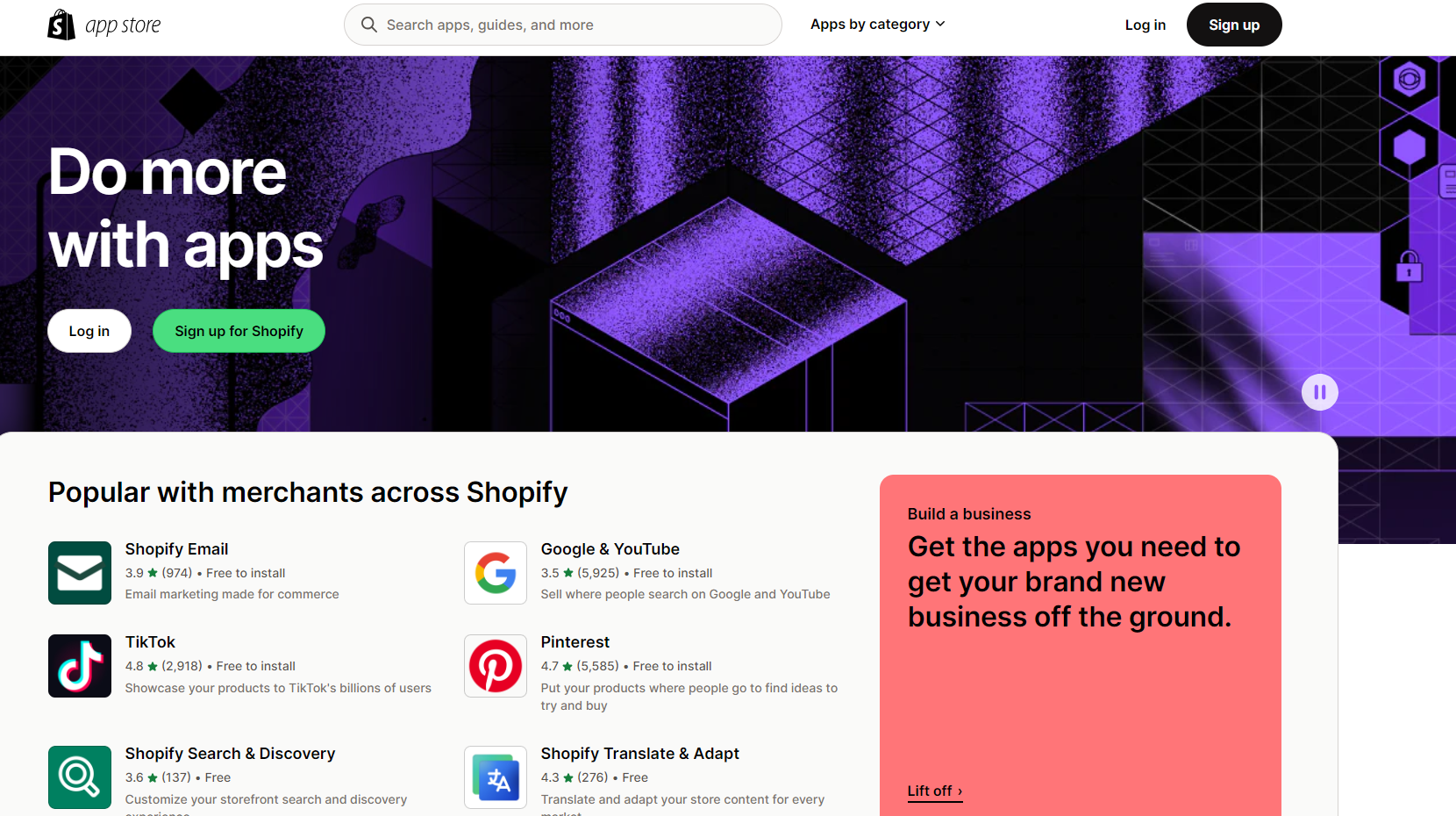
It truly has everything you might need! So, for listing all the apps like I did with Big Cartel, I will probably need a whole new blog article.
As a result, you can easily access the Shopify app store right from your dashboard. This direct access makes it super convenient to find the tools you need without leaving your store management environment.
Thus, you can check out the 39 Must-have Shopify Tools for Your Dropshipping Store In 2025.
Furthermore, you can also simply head over to the Shopify app store to browse through the variety of applications available. Here, you can explore and select apps that best meet your specific business requirements, ensuring that you’re equipped to maximize your online store’s potential.
For example, I personally integrate with popular apps like Spocket, Zendrop, and many more!
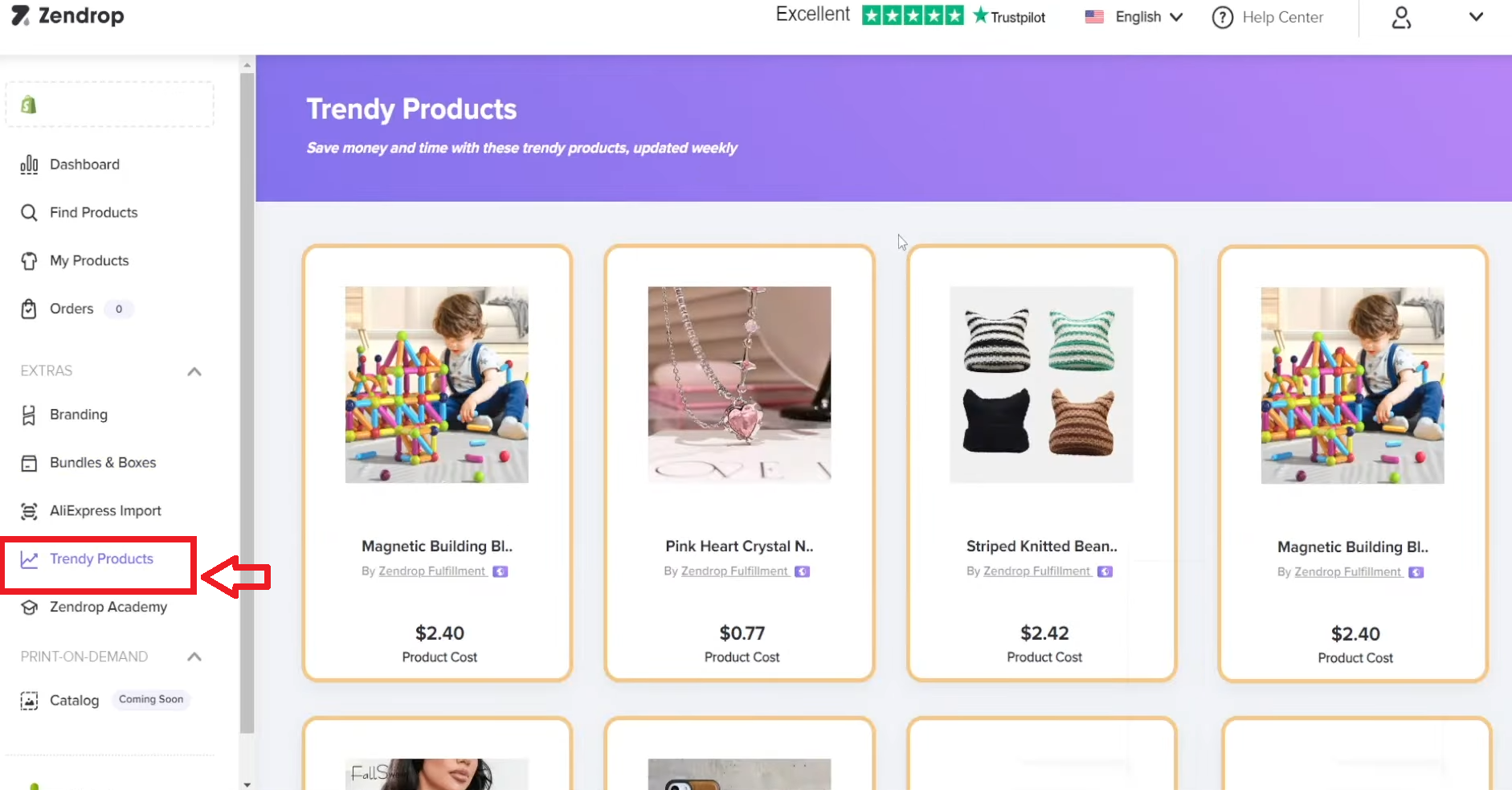
Moreover, Shopify has tools for you to optimize your website for search engines, create email campaigns, run social media ads, abandoned cart recovery, and lots of shipping tools.
Payment Options
Big Cartel Payment Options
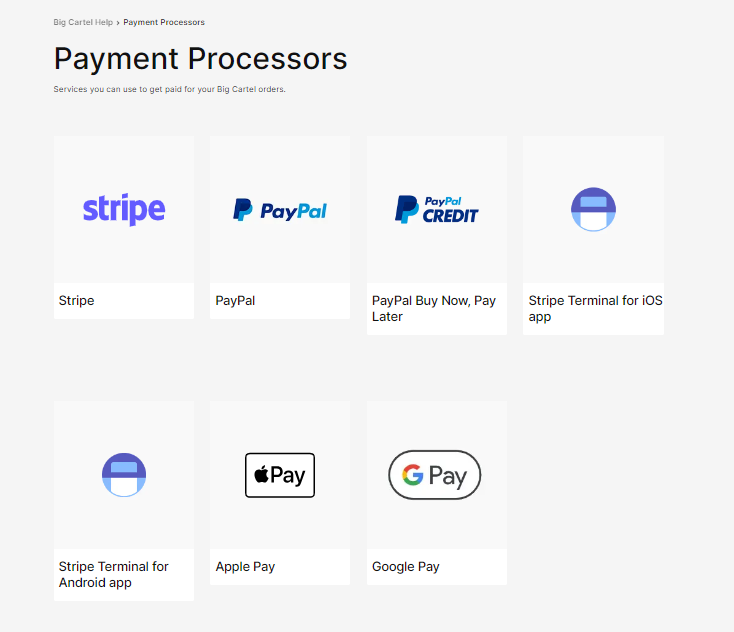
Big Cartel has a more limited selection of payment gateways compared to larger e-commerce platforms, but it includes the main options you’re likely to need:
- PayPal
- Stripe
- Apple Pay
- Square
Apple Pay and Square require separate app installations.
Interestingly, Big Cartel doesn’t charge any transaction fees for payment processing. The fees you end up paying will depend on the payment provider you choose.
For example, with Stripe, you’ll pay 2.9% plus 30 cents per transaction for online sales and 2.7% plus 5 cents per transaction for in-person credit card processing.
PayPal charges 2.59% plus 49 cents per transaction for online credit and debit card payments, and 2.7% per transaction for in-person credit card payments.
This setup means that while your options might be limited, the essential services are available, and you can keep costs relatively clear and straightforward.
Shopify Payment Options
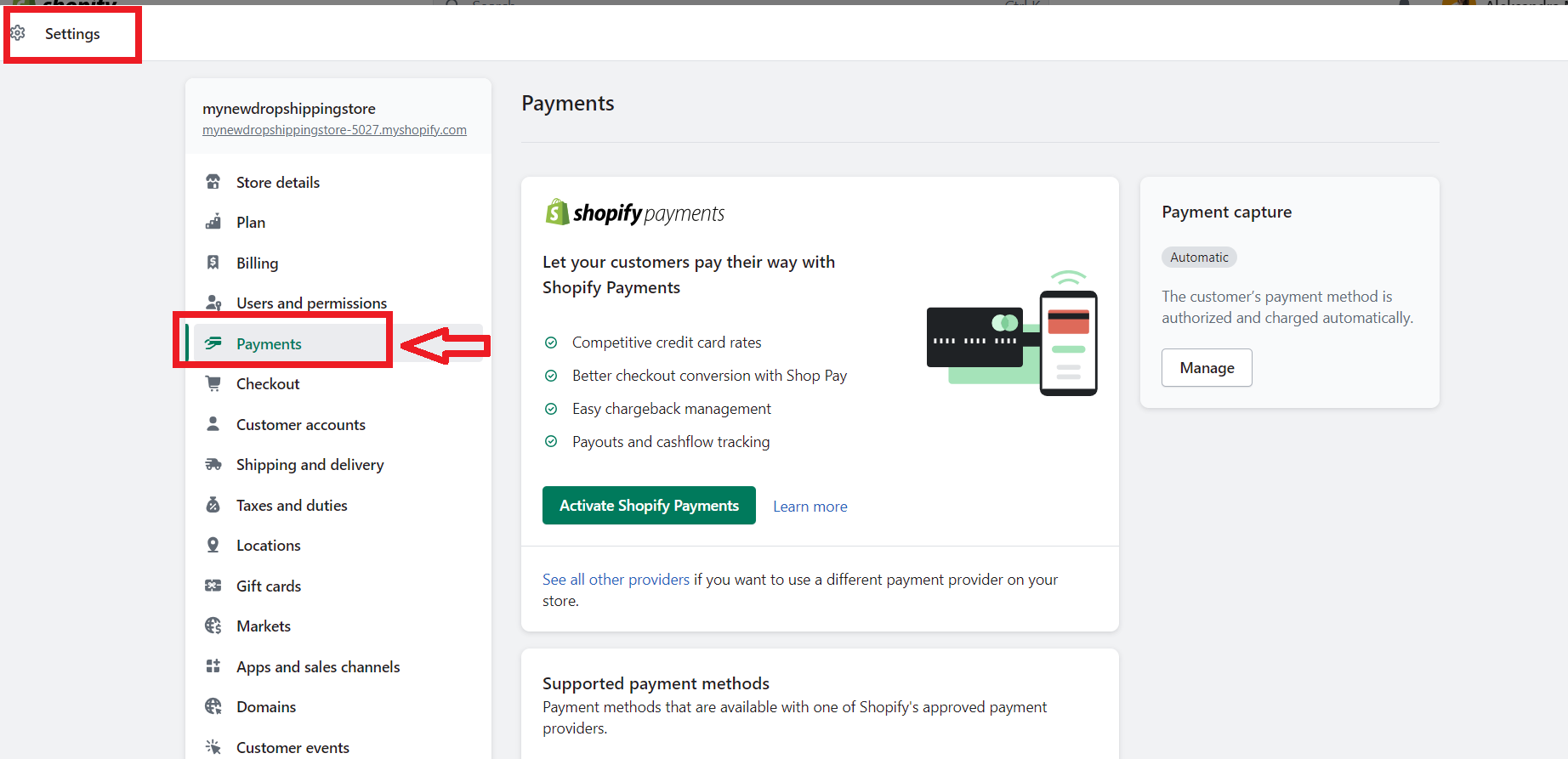
Shopify provides a variety of payment options, including Shopify Payments, Apple Pay, Amazon Pay, Google Pay, PayPal, and Shop Pay.
When you use Shopify Payments to handle transactions, there’s a fee of up to 2.9% plus 30 cents per transaction.
However, if you choose a different payment processor, you’ll face an additional transaction fee of up to 2% on top of the charges from the third-party provider.
As a result, as your sales volume increases, Shopify might become even more attractive because the cost per transaction remains relatively stable. This stability can make budgeting easier and help you keep a handle on costs as you scale up.
SEO Tools
Big Cartel’s themes are well-designed, featuring clear navigation, valid markup, and proper headers. However, a significant limitation is that you don’t have much control or flexibility when it comes to editing URLs, creating redirects, or publishing blog content.
On the other hand, Shopify excels in the realm of SEO tools and advanced features. Managing meta descriptions, titles, and headings is straightforward and user-friendly compared to other platforms. Additionally, enhancing SEO on product pages is quite feasible with Shopify.
Moreover, Shopify offers a broad array of SEO tools, with around 736 applications specifically aimed at improving SEO. It also provides strong integrations with Google Analytics, making it easier for you to track and analyze your website traffic and fine-tune your SEO strategies.
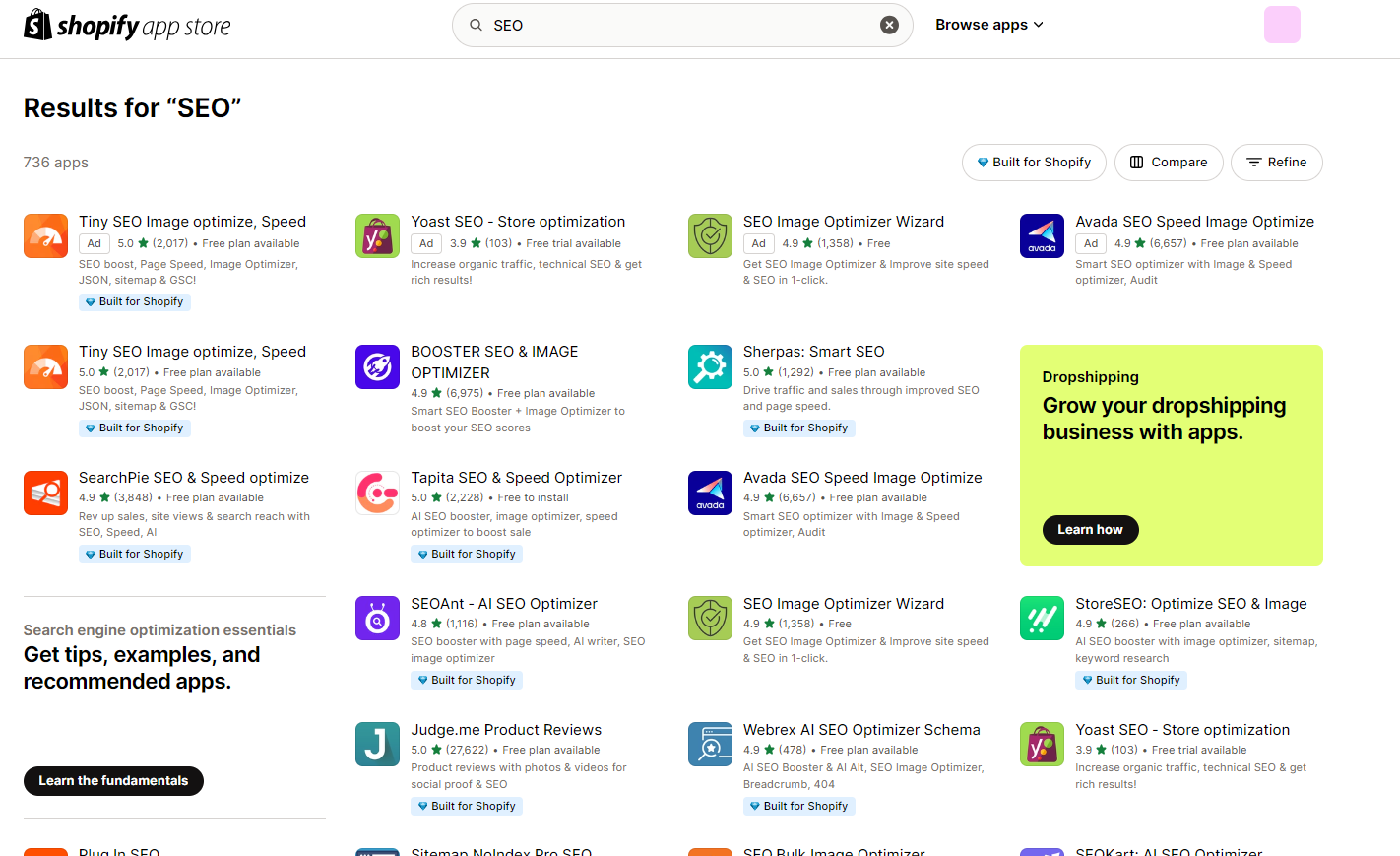
Shopify also allows you to create a blog, which can significantly contribute to driving traffic and increasing sales, giving you an edge in boosting your site’s visibility and effectiveness.
Web Hosting
Big Cartel vs Shopify handles the web hosting part of setting up a website for you, which simplifies the process of going online.
However, if you prefer a custom domain name that doesn’t include “bigcartel.com” or “myshopify.com” in your URL, you’ll need to make an additional purchase or arrange an integration.
This step is essential if you want to give your store a more professional look and feel with a personalized web address.
Big Cartel Web Hosting
With Big Cartel, if you want to have your own domain name, you’ll need to purchase it from a third-party platform like GoDaddy and then link it to your Big Cartel account.
On the other hand, Shopify gives you the convenience of buying a domain directly through its platform or connecting one you’ve already purchased from another provider.
This flexibility can make setting up your online store a bit smoother and more integrated, depending on your needs.
Shopify Domain & Web Hosting
When you first launch a store on Shopify, your store’s web address will typically follow the format ‘your-first-Shopify-store-name.myshopify.com’.
However, this default URL may not look very professional and might not rank well in search engine results. To truly establish and build your brand, you’ll need a custom domain—a unique, branded web address that clearly represents your store.
To customize the domain for your dropshipping store, navigate to ‘Online store’ > ‘Domains’ in your Shopify dashboard. Here, you’ll find three options:
- Connect to an existing domain if you already own a custom domain.
- Use a third-party domain by purchasing one from providers like GoDaddy, Bluehost, or Dreamhost.
- Buy a domain directly from Shopify, which can be a simple and streamlined way to align your domain with your brand.
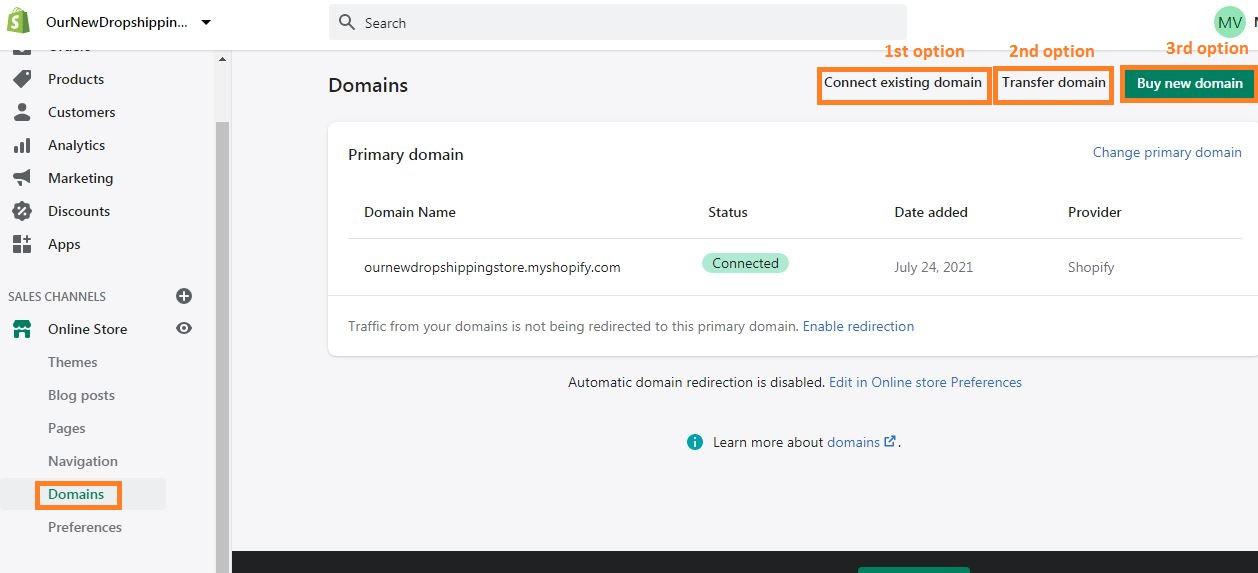
I suggest considering buying your domain directly from Shopify as it keeps everything integrated and straightforward. However, the final choice is yours, and it depends on your specific needs and preferences.
Point Of Sale
Big Cartel and Shopify both handle the calculation and remittance of sales tax for online transactions automatically, directing it to the relevant authorities. However, a key point to note is that Big Cartel does not collect sales tax on in-person sales made through its app.
On the other hand, Shopify automatically collects sales tax for transactions made using its Point of Sale (POS) system and tap reader.
Shopify POS can be installed as a mobile app on both iOS and Android devices, allowing you to transform your smartphones or tablets into complete point-of-sale systems without the need for costly hardware.
Moreover, Shopify includes this feature in every paid plan, providing you with comprehensive access to its POS capabilities. This makes it a great tool for businesses that operate both online and offline.

Inventory & Order Management
Big Cartel Inventory & Order Management
Managing your inventory with Big Cartel might feel a bit unusual since there isn’t a dedicated category section.
Instead, you can set up categories by clicking on the three dots in the product section and then choosing to manage categories.
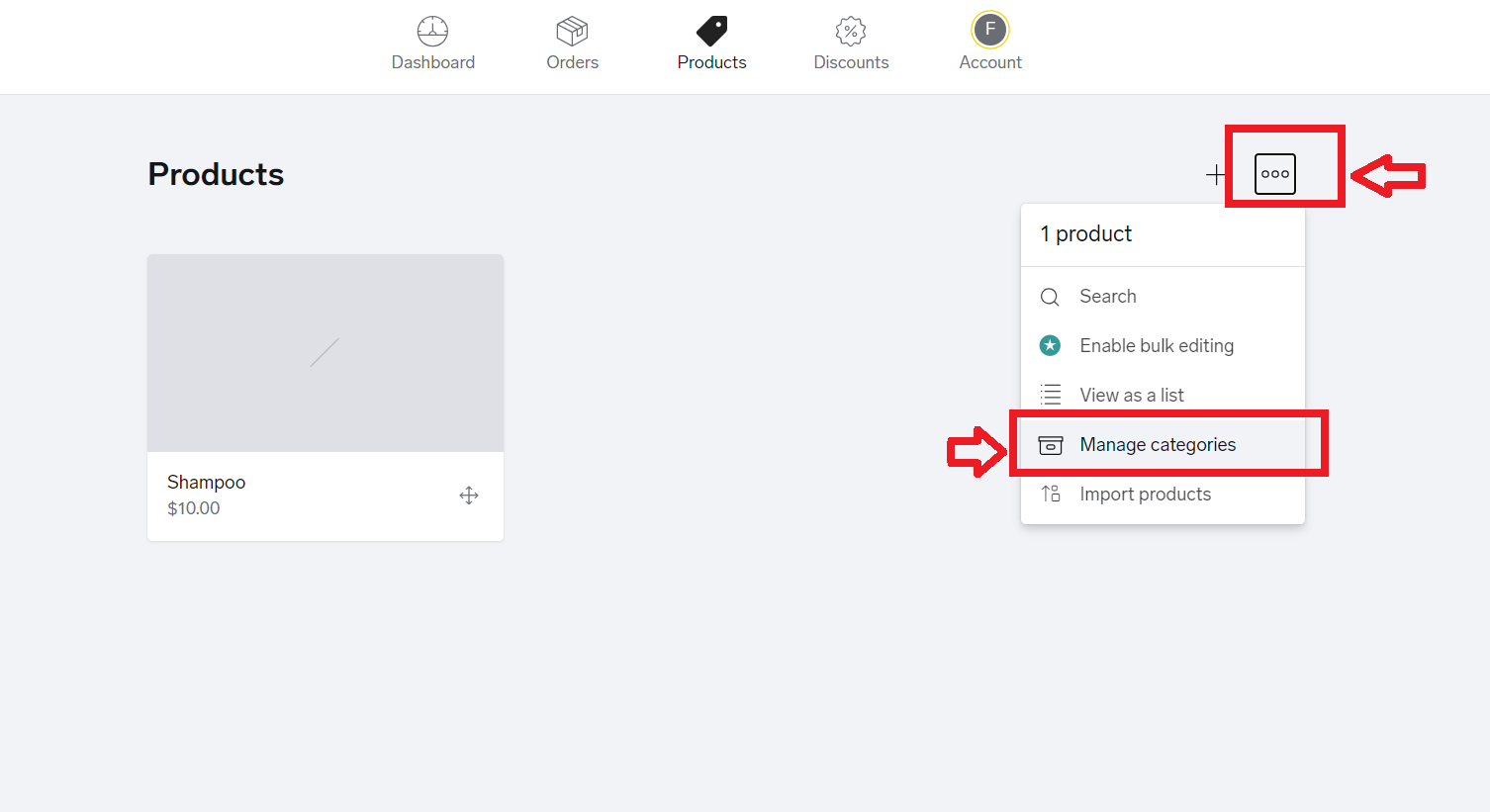
Here, you have the option to create a new category, but the only detail you can control is the category’s name.
You can also add categories directly on the product creation page by clicking the + icon next to categories.
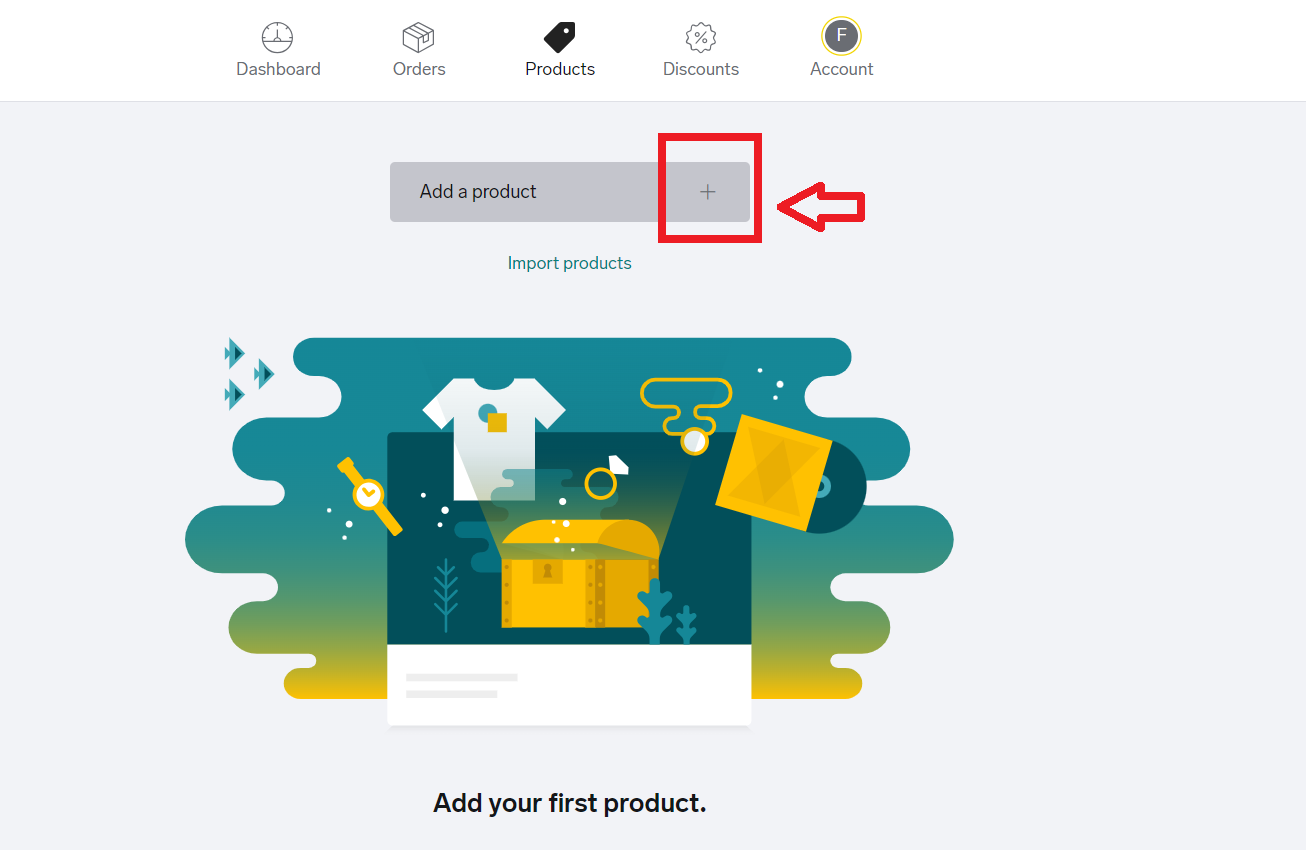
This process is straightforward, although it’s worth noting that you can’t add sub-categories. Any categories that you create and assign products to will automatically appear in the product section of your site’s navigation bar.
Additionally, there’s no feature available to manually create an order, which might limit some of your operational flexibility.
Shopify Inventory & Order Management
Shopify offers a centralized inventory management system that lets you handle your stock across various sales channels such as online stores, marketplaces, and physical locations.
Thus, this system automatically updates your inventory in real-time, which helps ensure that the stock information shown to customers is always accurate and helps prevent overselling.
Additionally, Shopify allows you to create and manage product variants, handle backorders, monitor inventory levels, set alerts for low stock, and generate detailed inventory reports.
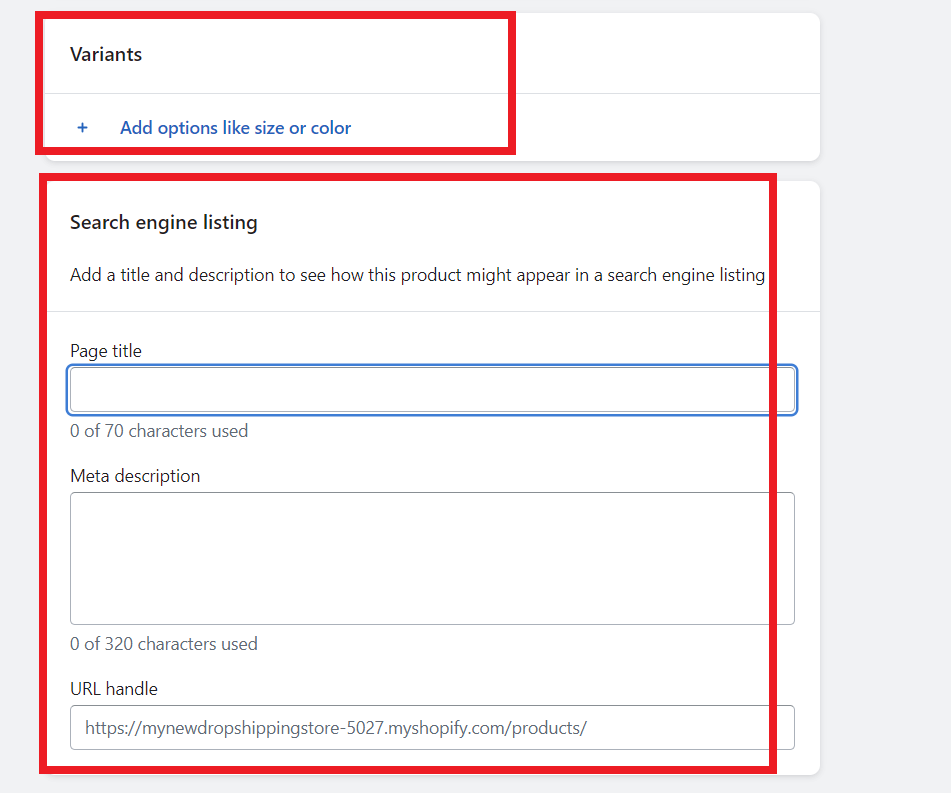
Moreover, Shopify supports barcode scanning, which simplifies the process of managing your inventory.
With barcode scanning, you can quickly scan products and immediately update stock levels, making the entire inventory management process smoother and more efficient.
Customer Support
Big Cartel Customer Support
The primary way to get help is through email, which is available from Monday to Friday between 9 AM and 6 PM EST. While there appears to be a live chat option, it actually just redirects you to email support, so don’t be misled.
In comparison to other platforms, Big Cartel’s support offerings are quite limited. If you encounter issues while setting up or running your store, you may need to depend heavily on your own problem-solving skills to move forward.
However, if direct assistance isn’t critical for you, Big Cartel’s Help Center is straightforward and user-friendly, allowing you to quickly locate useful information and help articles.
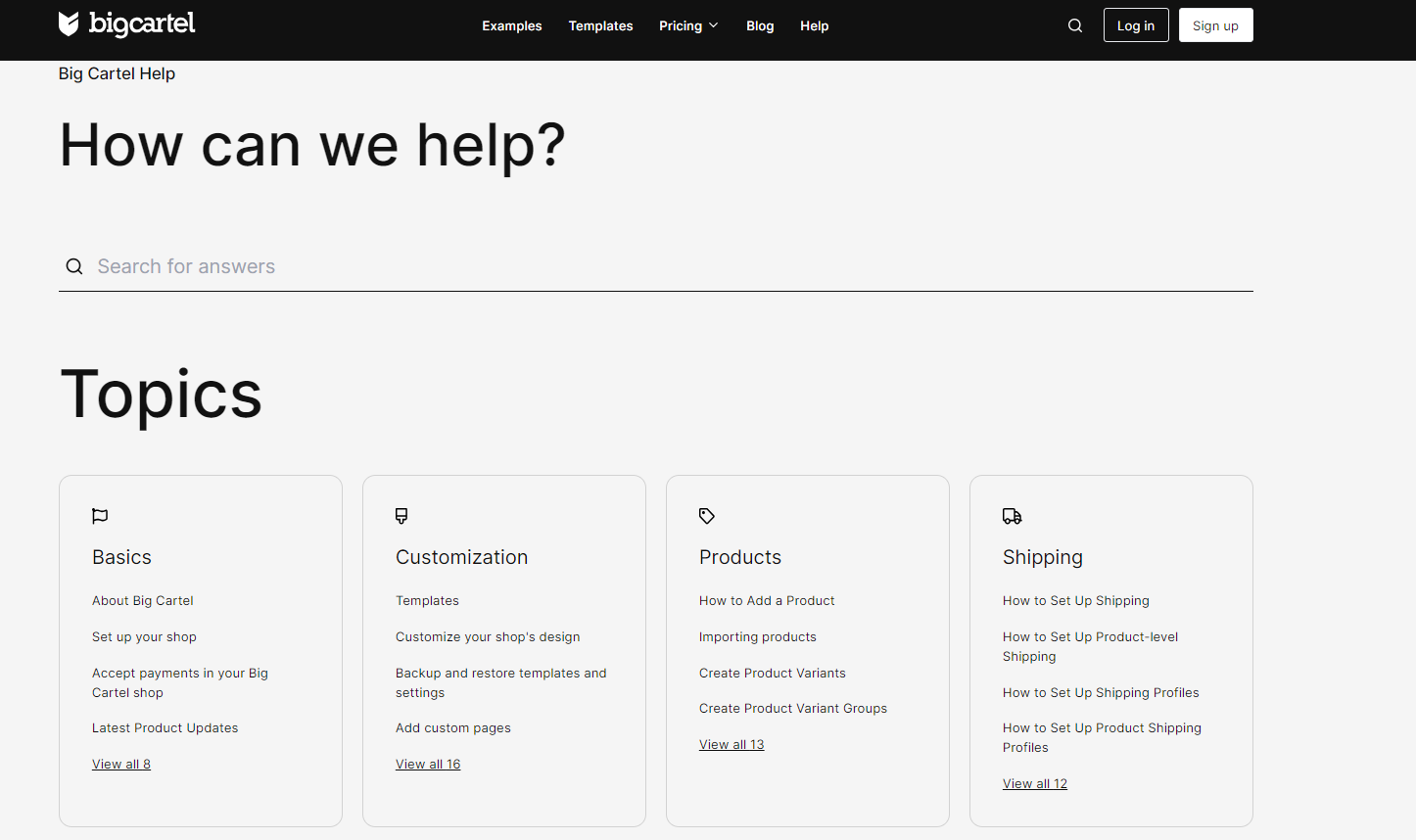
The layout of the Help Center is clear and simple, making it easy to navigate and find the help you need.
Shopify Customer Support
Shopify offers comprehensive support across all its paid plans, ensuring you have the help you need, whenever you need it. Here’s what you can access:
- 24/7 phone support
- Support via social media
- 24/7 live chat
- Community forums
- Email support
- Video tutorials
- Access to advanced specialist support
This variety ensures that you can choose the type of support that works best for you. If you opt for Shopify’s Plus plan, you even get a dedicated support agent, enhancing your support experience significantly.
Shopify’s Help Center is also well-organized, featuring a range of categories and a search function that makes finding information straightforward.
So, you can quickly locate helpful articles or use the search feature to find specific answers. Also, their virtual help center assistant can also answer all your questions.
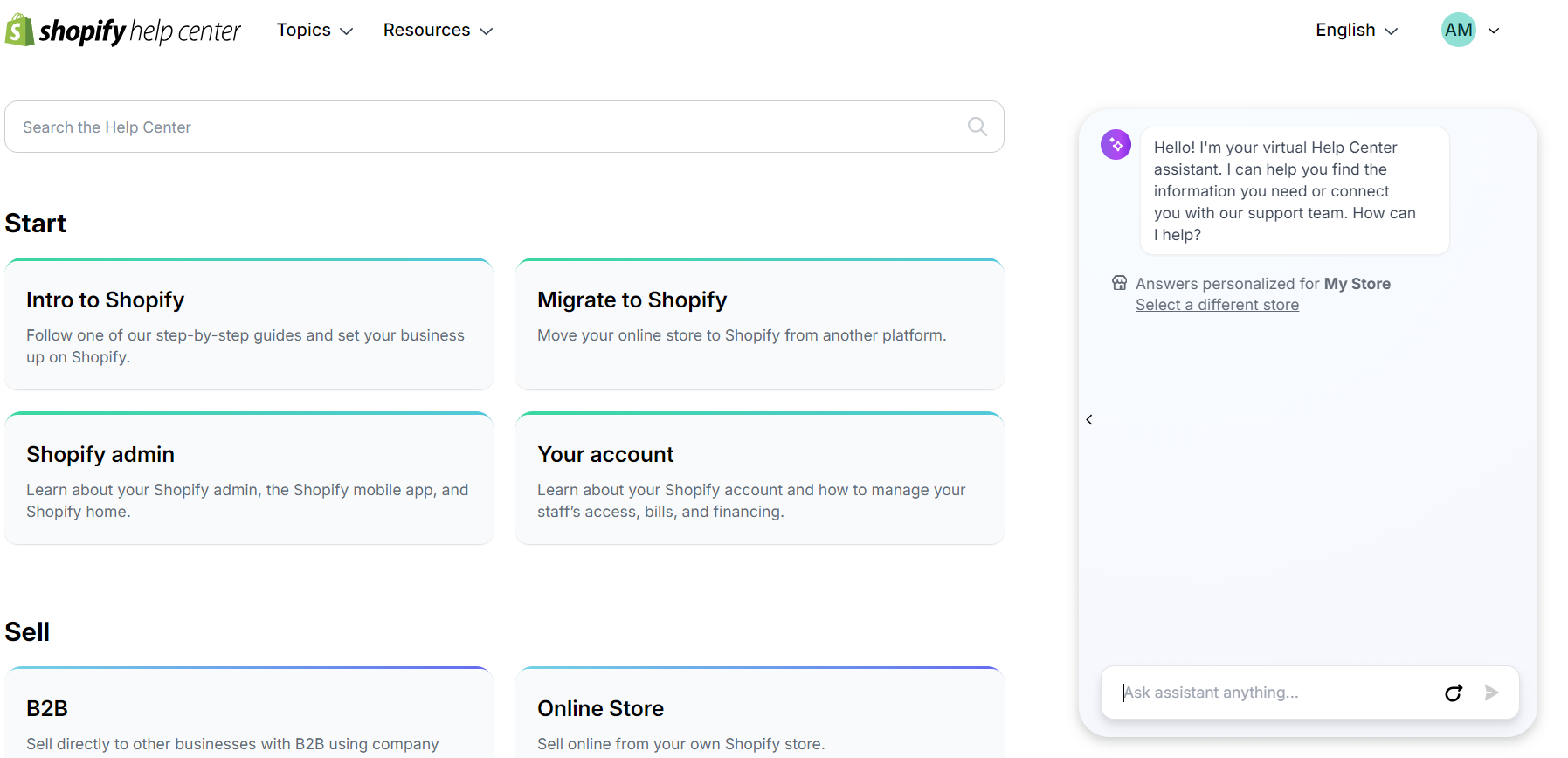
Like Big Cartel, Shopify’s strength in customer support is evident in its well-structured Help Center, which simplifies finding solutions.
When you seek help while editing your store, Shopify cleverly directs you to relevant articles, saving you time and effort in your search for answers.
Big Cartel vs Shopify: Dropshipping
Now, I will review how Big Cartel vs Shopify helps with dropshipping.
Big Cartel Dropshipping Options
Big Cartel isn’t specifically tailored for dropshipping in the same way some other e-commerce platforms are, like Shopify. It primarily serves artists and makers who typically sell products they’ve created themselves.
However, you can still set up a dropshipping business on Big Cartel with a bit of creativity and the use of external services.
To run a dropshipping model on Big Cartel, you would need to manually integrate with third-party dropshipping apps or services.
Also, Big Cartel allows you to engage in dropshipping, specifically if you want to sell products featuring your art. For instance, the platform integrates with print on demand services like Printful and Art of Where.
Beyond these options, however, Big Cartel’s capabilities for dropshipping automation are quite limited.
Furthermore, the platform is particularly effective for dropshipping digital products. If your business focuses on digital goods, Big Cartel could be a suitable choice.
Remember, if you plan to expand beyond these specific scenarios, you might find the platform’s dropshipping features a bit restrictive.
Shopify Dropshipping Options
Shopify is a well-known e-commerce platform that simplifies setting up a dropshipping business. It’s particularly user-friendly for retailers looking to adopt the dropshipping model.
The platform features about 551 dropshipping apps that integrate smoothly with it. These apps enable you to connect with various suppliers and easily import products directly into your online store.
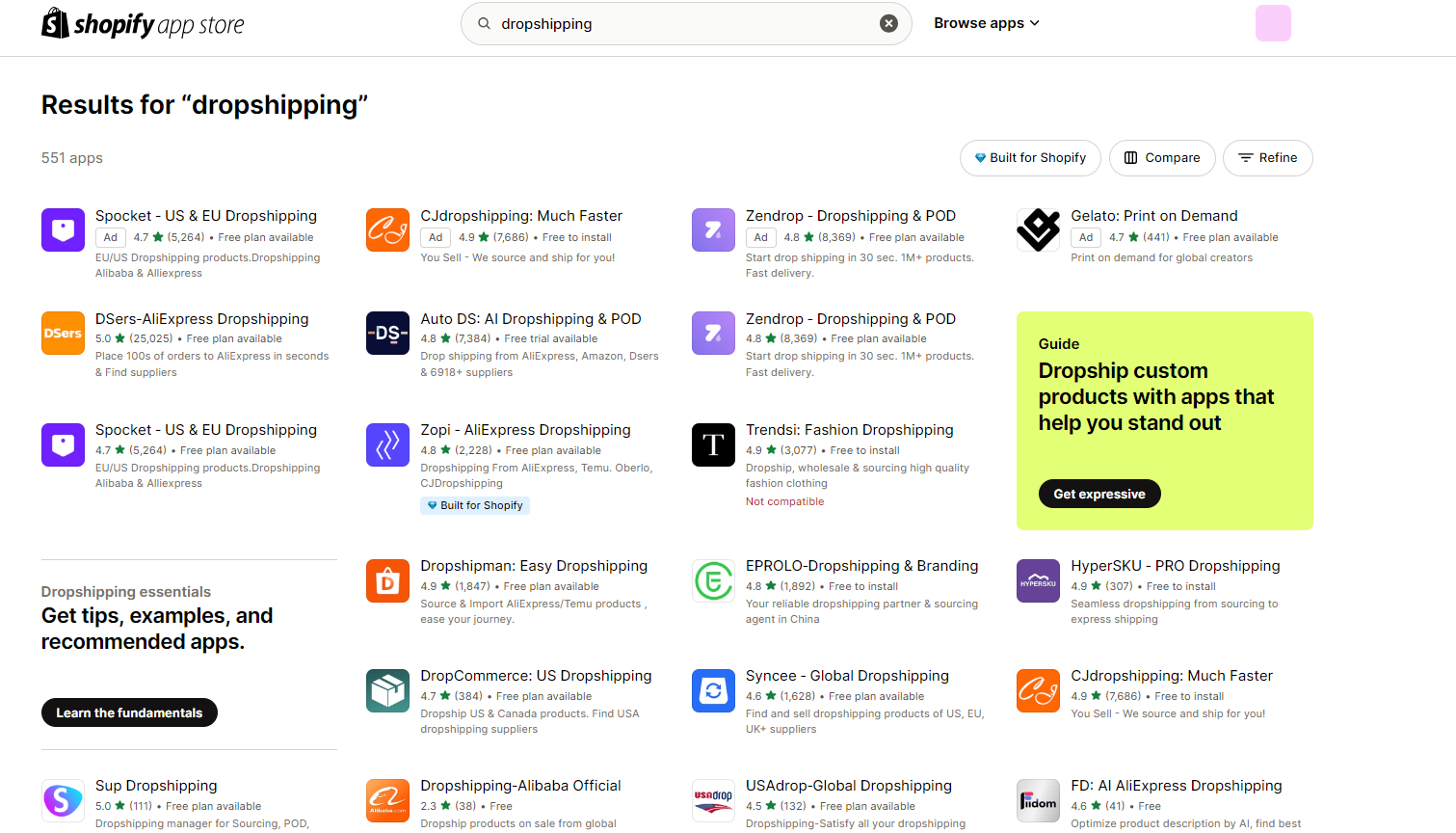
Additionally, Shopify provides a range of automation tools, including those for inventory and marketing management. One of the key features is the ability to automate the order processing workflow.
When a customer places an order, the details are automatically sent to the supplier, who then handles the fulfillment and shipping directly.
However, when it comes to Big Cartel vs Shopify, I must say Shopify stands out with more comprehensive dropshipping capabilities, giving it an advantage if you’re focused heavily on dropshipping.
Big Cartel vs Shopify: Pricing Plans
BigCartel Pricing
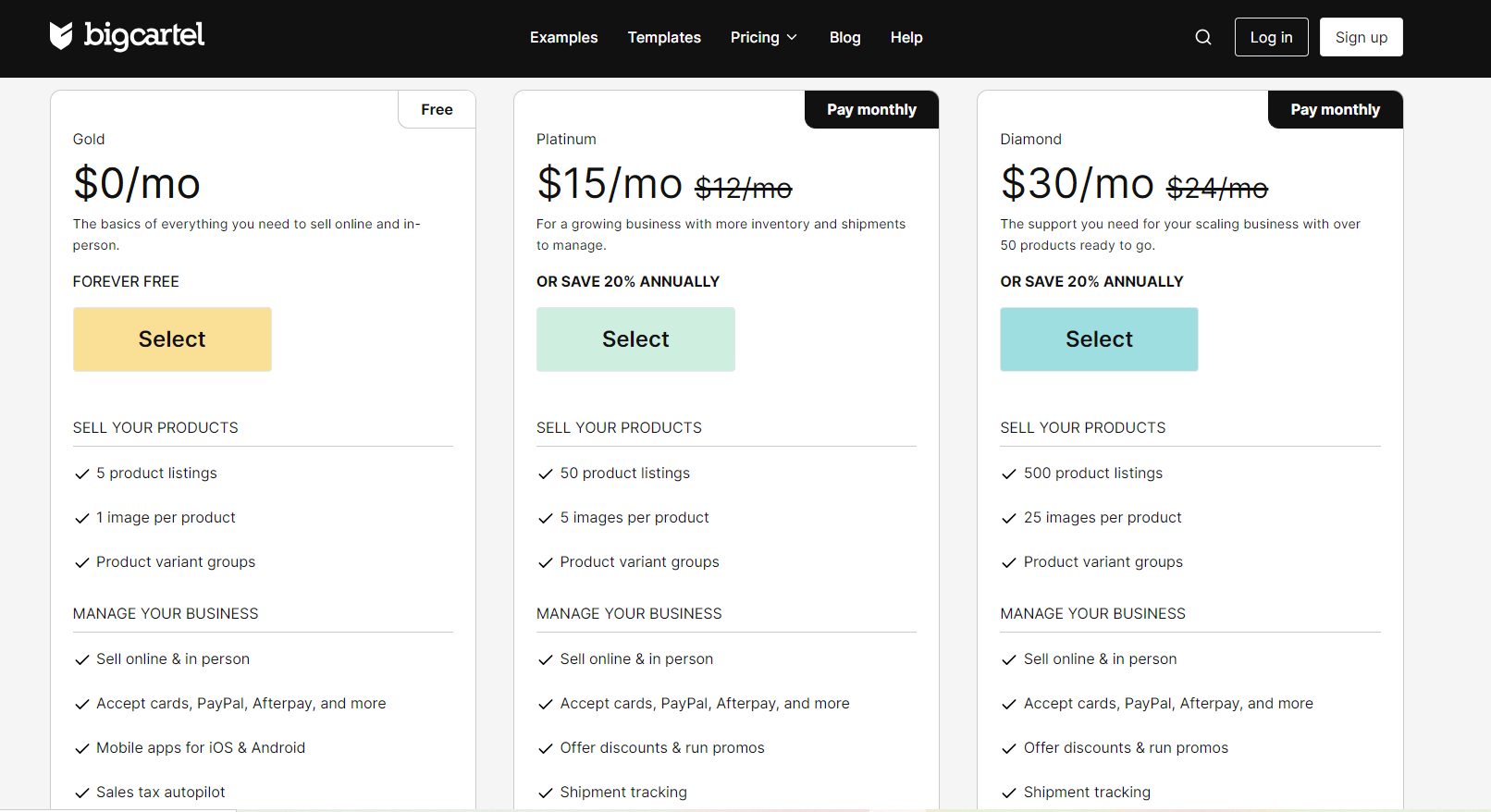
Gold Plan
The Gold Plan is presented as a forever-free option, priced at $0 per month. It’s an introductory package designed for new entrepreneurs who need the essential tools to start selling online and in person.
Under this plan, users can sell their products with up to 5 product listings and 1 image per product, including options for product variant groups.
Business management is facilitated with capabilities to sell both online and in-person, accept various payment methods like cards, PayPal, and Afterpay, and access mobile apps for iOS and Android. The sales tax is handled automatically, simplifying the administrative workload.
For store customization, there are free, SEO-optimized templates available, ensuring that even entry-level users can set up an attractive, search-friendly online store.
Performance tracking is straightforward with a real-time sales dashboard to monitor sales activities.
Thus, when it comes to Big Cartel vs Shopify, this is one of its pros.
Platinum Plan
The Platinum Plan is tailored for growing businesses, costing $15 per month, with an annual billing option of $180 or $144 with a 20% discount. This plan supports larger inventories and more complex shipment management needs.
It expands the selling capabilities to 50 product listings, allows up to 5 images per product, and includes all features of the Gold Plan.
Additionally, this tier introduces features like the ability to offer discounts, run promotions, and track shipments. Inventory tracking and bulk editing tools are also included to manage larger product volumes more efficiently.
The customization capabilities are enhanced with options for using a custom domain and advanced template customization.
You can also leverage ad support for platforms like Google and Facebook to drive more traffic and sales. The integration of Google Analytics helps in deeper insight into store performance.
Diamond Plan
Designed for scaling businesses, the Diamond Plan is priced at $30 per month, with an option to pay $360 annually or $288 with a 20% discount. This plan supports you with a significant online presence, offering up to 500 product listings and 25 images per product.
In addition to all the features included in the Platinum Plan, the Diamond Plan introduces ads with audience targeting for enhanced marketing precision on platforms like Google and Facebook. It also provides prioritized support to ensure any issues are quickly addressed.
The plan also includes advanced Google Analytics reporting, enabling you to gain more detailed insights into their traffic and sales performance. This is essential for making data-driven decisions to further optimize operations and marketing strategies.
Shopify Pricing Plans
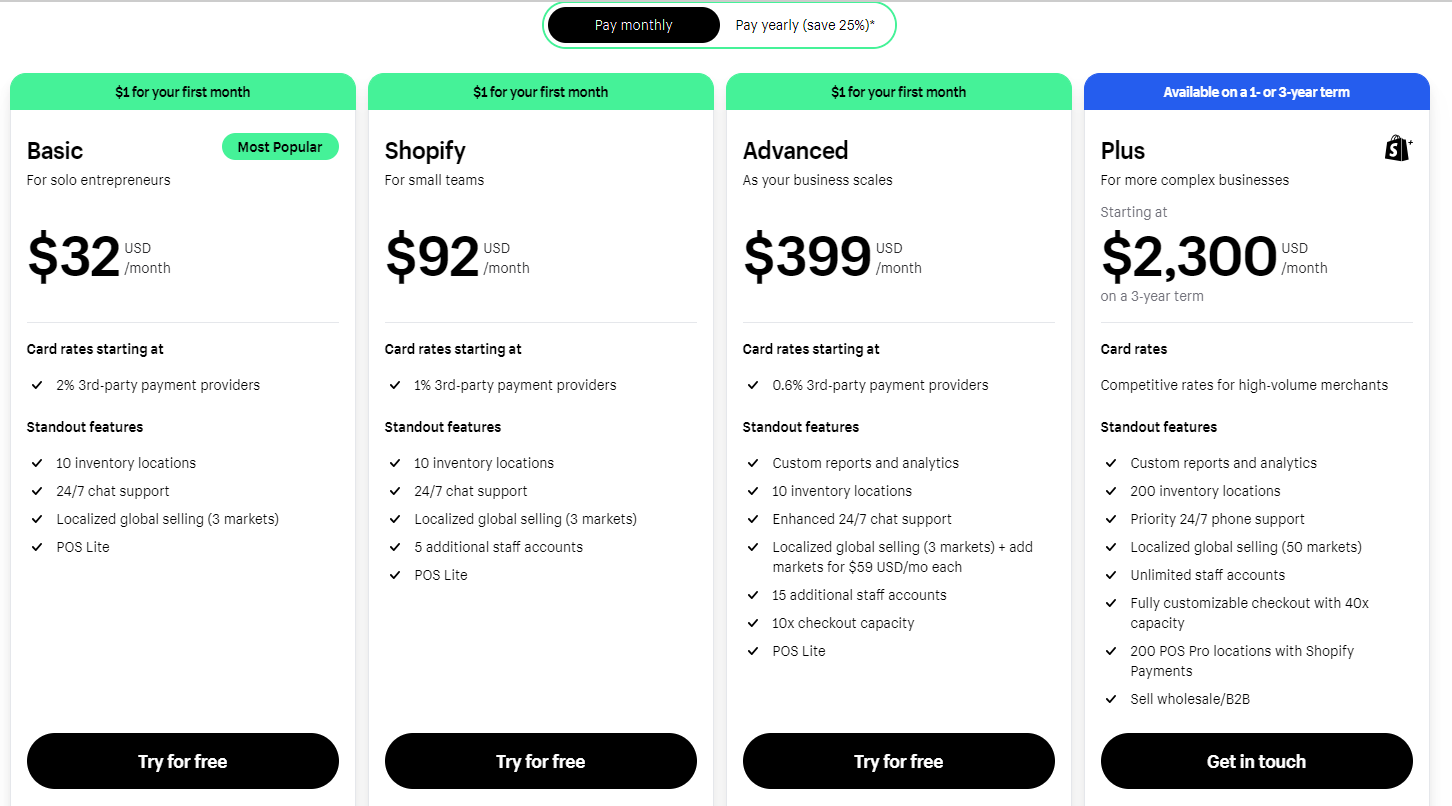
Shopify offers a variety of pricing plans tailored to different business needs:

Shopify Basic -$32/month
At $32/month, this plan is great for dropshippers looking to enhance their online presence. It includes website customization, a shopping cart, and access to social media channels like Instagram and Pinterest, as well as marketplaces such as Amazon, eBay, and Google Shopping.
Additional features include abandoned cart recovery, fraud analysis, and 24/7 support to enhance customer experience. Note that this plan allows for only one staff account and has a transaction fee of 2.9% + 30¢ per transaction. Also, using a payment gateway other than Shopify Payments adds an extra 2% fee per transaction.
Shopify Regular – $92/month
Priced at $92/month, this plan suits you with more sales and complex needs. It builds on the Basic plan’s features, adding capabilities like advanced report building and real-time carrier shipping.
You can create up to five staff accounts, offer gift cards, and access Professional Reports for deeper insights into sales and customer data. The transaction fee for this plan is 2.4% + 30¢.
Shopify Advanced – $399/month
At $399/month, this plan is ideal for high-volume dropshipping businesses needing advanced inventory management and reporting.
It allows up to 15 staff accounts and includes duties and import tax calculations, along with advanced shipping rates, tax, and discount reporting.
This plan is recommended for its comprehensive features that support larger-scale operations.
Shopify Plus – $2,300/month
Starting at $2,300/month, Shopify Plus is designed for large enterprises, offering unlimited staff accounts, priority support, advanced analytics, customizable checkout experiences, and support for up to 200 inventory locations.
The transaction fee is minimally set at 0.2%. Pricing may vary based on monthly sales, reflecting the tailored needs of large businesses.
Big Cartel Pros & Cons
Pros of Big Cartel
 User-friendly
User-friendly
Big Cartel’s dashboard is straightforward, making it super easy for anyone to set up and manage an online store.
 Great Value
Great Value
Even the most expensive Big Cartel plan is cheaper than the basic options offered by many other top e-commerce platforms, including Shopify.
 Free Templates
Free Templates
You don’t have to pay extra for design templates on Big Cartel. They are all free.
 Sales Flexibility
Sales Flexibility
Big Cartel provides the flexibility to sell both online and in person. You can offer physical goods as well as digital products.
 Custom Domain
Custom Domain
If you’re on a paid plan, you can use a custom domain for your store.
 Mobile Apps
Mobile Apps
Big Cartel has mobile apps for both iOS and Android, allowing you to manage your store and monitor sales from anywhere.
Cons of Big Cartel
 Low Product Caps
Low Product Caps
Unlike platforms like Shopify that allow unlimited products, Big Cartel limits you to 500 products on its highest plan, and the free version only allows five.
 Missing Advanced Features
Missing Advanced Features
Big Cartel lacks several advanced features that other e-commerce platforms offer, such as shipping calculations by product weight, abandoned cart recovery, and the ability to sell services and memberships. There’s also no built-in option for blogging.
 Minimal SEO Tools
Minimal SEO Tools
Big Cartel offers only basic SEO tools, which might not be enough for those looking to optimize their store for search engines thoroughly.
 Limited Customizability
Limited Customizability
With around 18 design templates and limited options for site customization, Big Cartel doesn’t offer as much flexibility in designing your store compared to other platforms.
Shopify Pros & Cons
Pros of Shopify
 Feature-Packed
Feature-Packed
Shopify is loaded with features like advanced shipping options, cart recovery, and the ability to handle subscriptions and blogging right on your site.
 Scalable
Scalable
It grows with you. Whether you’re just starting or expanding, Shopify can handle your needs with ease. So, when it comes to Big Cartel vs Shopify, this is a big win for the platform.
 No Product Limits
No Product Limits
You can list as many products as you want on Shopify, giving you the freedom to expand without restrictions.
 Strong SEO Capabilities
Strong SEO Capabilities
Shopify has solid SEO tools that can help bring more visitors to your store organically.
 Customizable Designs
Customizable Designs
With over 70 themes and detailed customization options, Shopify lets you create a unique look for your store.
 Mobile Management
Mobile Management
Manage your store on the go with Shopify’s comprehensive mobile app.
Cons of Shopify
 Costs More
Costs More
Shopify’s plans are pricier compared to Big Cartel, especially when adding apps and premium themes. Thus, this is one of their downsides when it comes to Big Cartel vs Shopify.
 Includes Extra Fees
Includes Extra Fees
If you don’t use Shopify Payments, you’ll face additional transaction fees on sales.
 More Complex than Big Cartel
More Complex than Big Cartel
Shopify’s wide array of features can be overwhelming for newcomers looking for simplicity.
 Few Free Themes
Few Free Themes
While there are plenty of themes, the free options are limited, which might push you towards a paid theme.
Conclusion
In my opinion, when it comes to dropshipping, Shopify stands out as the more robust choice. With its extensive array of integrations, automation tools, and scalability, Shopify is best if you are looking to grow rapidly and efficiently.
It offers a vast ecosystem of apps that can streamline every aspect of your business, from inventory management to customer acquisition and retention.
However, if you’re just starting out or if your business revolves around selling limited quantities of niche products, Big Cartel could be the platform for you. Its simplicity and lower cost structure make it ideal for small-scale entrepreneurs who need an uncomplicated online store without the bells and whistles.
Ultimately, the decision between Big Cartel vs Shopify should be based on your specific business needs, projected growth, and the level of customization you require.
So, consider your long-term goals and how much you’re willing to invest in setting up and maintaining your online store.
Choose wisely, as the platform you select can significantly influence the trajectory of your dropshipping venture.















![The Top 21 3PL Companies Compared [2025 List & Guide]](https://images.weserv.nl/?url=https://prod-dropshipping-s3.s3.fr-par.scw.cloud/2024/03/Frame-3922469.jpg&w=420&q=90&output=webp)